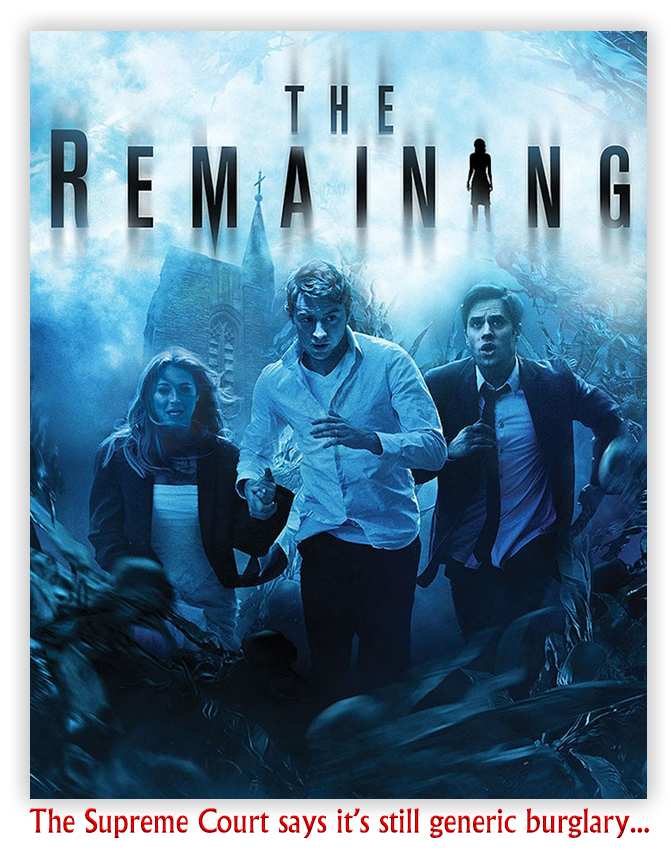We post news and comment on federal criminal justice issues, focused primarily on trial and post-conviction matters, legislative initiatives, and sentencing issues.

SUPREME COURT HOLDS THAT ‘REMAINING IN” BURGLARY IS GENERIC BURGLARY UNDER ACCA
Jamar Quarles was convicted of being a felon in possession of a gun under 18 USC § 922(g)(1). Because he had three prior convictions for crimes of violence, he was sentenced to a mandatory minimum sentence of 15 years under 18 USC § 924(e), the Armed Career Criminal Act.
 In order to be a crime of violence, you may recall, 18 USC 924(e) requires that the conviction either be (1) for burglary, arson, use of explosives or extortion (the “enumerated crimes” clause); or (2) a crime involving an actual or threatened use of physical force against another person (the “elements” clause).
In order to be a crime of violence, you may recall, 18 USC 924(e) requires that the conviction either be (1) for burglary, arson, use of explosives or extortion (the “enumerated crimes” clause); or (2) a crime involving an actual or threatened use of physical force against another person (the “elements” clause).
Jamar appealed his ACCA conviction, arguing that one of the prior offenses, Michigan third-degree home invasion, was not generic burglary, because its terms were broader than mere generic burglary. Thus, he maintained, the home invasion did not fit the definition of “crime of violence” under the enumerated crimes clause.
Some 29 years ago, the Supreme Court in Taylor v. United States defined generic burglary under §924(e) to mean “unlawful or unprivileged entry into, or remaining in, a building or structure, with intent to commit a crime.” The Michigan third-degree home invasion statute applied when a person “breaks and enters a dwelling or enters a dwelling without permission and, at any time while he or she is entering, present in, or exiting the dwelling, commits a misdemeanor.”
Jamar argued that this provision was too broad, because it encompassed situations where the defendant forms the intent to commit a crime at any time while unlawfully remaining in a dwelling. He contended that generic remaining-in burglary under the ACCA occurs only when the defendant has the intent to commit a crime at the exact moment when he or she first unlawfully remains in a building or structure.
The District Court rejected that argument, and the Sixth Circuit affirmed. Yesterday, the Supreme Court agreed with the lower courts.
 The Supreme Court said that “remaining in” refers only to the burglary being a continuous event, that begins when one enters the building unlawfully and does not end until he or she exits. The common understanding of “remaining in” as a continuous event, the Court said, “means that burglary occurs for purposes of §924(e) if the defendant forms the intent to commit a crime at any time during the continuous event of unlawfully remaining in a building or structure.” To put it in conventional criminal law terms, the Court explained, “because the actus reus [the act of burglary] is a continuous event, the mens rea [intent to commit a crime while there] matches the actus reus so long as the burglar forms the intent to commit a crime at any time while unlawfully present in the building or structure.”
The Supreme Court said that “remaining in” refers only to the burglary being a continuous event, that begins when one enters the building unlawfully and does not end until he or she exits. The common understanding of “remaining in” as a continuous event, the Court said, “means that burglary occurs for purposes of §924(e) if the defendant forms the intent to commit a crime at any time during the continuous event of unlawfully remaining in a building or structure.” To put it in conventional criminal law terms, the Court explained, “because the actus reus [the act of burglary] is a continuous event, the mens rea [intent to commit a crime while there] matches the actus reus so long as the burglar forms the intent to commit a crime at any time while unlawfully present in the building or structure.”
The Court made it clear what concerns partly drove the train. It observed that “the important point is that all of the state appellate courts that had definitively addressed this issue as of 1986 [the year the ACCA was adopted] had interpreted remaining-in burglary to occur when the defendant forms the intent to commit a crime at any time while unlawfully present in the building or structure… To interpret remaining-in burglary narrowly… would thwart the stated goals of the Armed Career Criminal Act. After all, most burglaries involve unlawful entry, not unlawful remaining in. Yet if we were to narrowly interpret the remaining-in category of generic burglary so as to require that the defendant have the intent to commit a crime at the exact moment he or she first unlawfully remains… many States’ burglary statutes would presumably be eliminated as predicate offenses under §924(e). That result not only would defy common sense, but also would defeat Congress’ stated objective of imposing enhanced punishment on armed career criminals who have three prior convictions for burglary or other violent felonies.”
Quarles v United States, Case No. 17-778 (Supreme Court, June 10, 2019)
– Thomas L. Root











